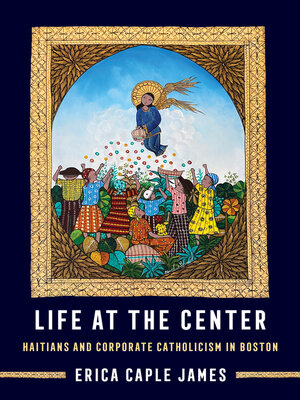Life at the Center
ebook ∣ Haitians and Corporate Catholicism in Boston · Atelier: Ethnographic Inquiry in the Twenty-First Century
By Erica Caple James

Sign up to save your library
With an OverDrive account, you can save your favorite libraries for at-a-glance information about availability. Find out more about OverDrive accounts.
Find this title in Libby, the library reading app by OverDrive.



Search for a digital library with this title
Title found at these libraries:
| Library Name | Distance |
|---|---|
| Loading... |
A free ebook version of this title is available through Luminos, University of California Press's Open Access publishing program. Visit www.luminosoa.org to learn more.
In Life at the Center, Erica Caple James traces how faith-based and secular institutions in Boston have helped Haitian refugees and immigrants attain economic independence, health, security, and citizenship in the United States. Using the concept of "corporate Catholicism," James documents several paradoxes of assistance arising among the Catholic Church, Catholic Charities, and the Haitian Multi-Service Center: how social assistance produces and reproduces structural inequalities between providers and recipients; how these inequities may deepen aid recipients' dependence and lead to resistance to organized benevolence; how institutional financial deficits harmed clients and providers; and how the same modes of charity or philanthropy that previously caused harm can be redeployed to repair damage and rebuild "charitable brands." The culmination of more than a decade of advocacy and research on behalf of the Haitians in Boston, this groundbreaking work exposes how Catholic corporations have strengthened—but also eroded—Haitians' civic power.
In Life at the Center, Erica Caple James traces how faith-based and secular institutions in Boston have helped Haitian refugees and immigrants attain economic independence, health, security, and citizenship in the United States. Using the concept of "corporate Catholicism," James documents several paradoxes of assistance arising among the Catholic Church, Catholic Charities, and the Haitian Multi-Service Center: how social assistance produces and reproduces structural inequalities between providers and recipients; how these inequities may deepen aid recipients' dependence and lead to resistance to organized benevolence; how institutional financial deficits harmed clients and providers; and how the same modes of charity or philanthropy that previously caused harm can be redeployed to repair damage and rebuild "charitable brands." The culmination of more than a decade of advocacy and research on behalf of the Haitians in Boston, this groundbreaking work exposes how Catholic corporations have strengthened—but also eroded—Haitians' civic power.







